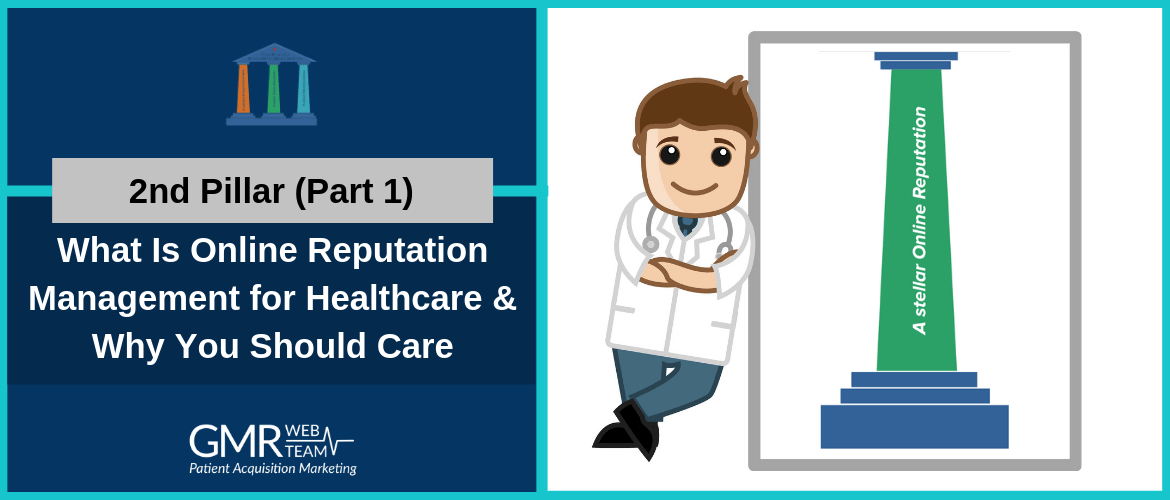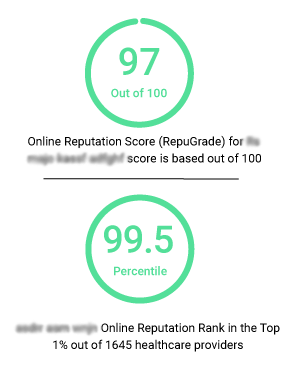2nd Pillar (Part 1): What Is Online Reputation Management for Healthcare & Why You Should Care

What Is Online Reputation Management?
Online reputation management for healthcare businesses deals with influencing people's or patients' perception about a provider or a practice brand by improving or restoring its good standing. It comprises of a set of marketing activities that focuses on countering and defeating negative content on the internet with more positive materials for improving the brand's credibility and trust. ORM doesn't need to be confused as a practice that aims at stopping unhappy patients from posting their negative comments, or removing negative comments from online sites. That's not what it does, but the contrary. ORM doesn't interfere with the negative content that are already posted online. All it does is encourage and facilitate happy patients to share their great experience online to increase the number of positive reviews in order to negate the impact of poor reviews and comments. Apart from tackling negative reviews, ORM also lets you improve your practice and its staff's productivity (as an end result) by helping you identify various shortcomings and improve upon them.
Why Having a Stellar Online Reputation Is So Crucial
Your online reputation is how you appear on the web in front of your patients. More essentially, it's about how users (patients) talk about you and what kind of content (positive or negative) they share regarding you, your practice, and its quality of care, when they come together online. Patients are free to share their views on review websites and social media sites like Yelp, HealthGrades, Facebook, Twitter, and more. Now, if you'll have a good reputation among your patients, most of these views will also reflect that goodwill. Not just that, discussions in patient communities on these platforms have a high influence over decision making of patients participating in them. If you'll have a high reputation among your patients, these communities will be filled with mostly positive notes regarding your service. A high number of positive content coming from these platforms will help increase your search rankings, which means a positive and increased visibility on the web. An overall high rating on review websites also expand your reach among a very targeted group of patients on these platforms too. Let's see what some data from highly authoritative sources on the web says, and what they say about the need of positive online reputation:
- 72% of patients use reviews as their first step in finding a doctor [SA]
- First step in finding a doctor simply means looking for reviews before anything else on the web. Suppose a patient who wants to get his teeth whitened will search “teeth whitening provider in New York” on Google. For this particular search, that patient will get resources such as providers' service pages for New York location, Yelp's or HealthGrades's reviews for providers' profiles, Facebook page's rating, etc. in the search result. What Software Advice says is that almost three-fourth of these searchers (patients) will first like to go through the quality of reviews for any given provider, even before checking out his/her website. Here, the provider with better average ratings and reviews has greater chances of acquiring that patient.
- 82% of patients are using online reviews to evaluate physicians [SA]
- Using online reviews to evaluate physicians means patients comparing review data from one or multiple review platforms for finalizing a provider out of a list of competitors. Now, consider the same search entry as for point number 1. The results may show different providers' web pages, ratings from one or more review websites, or social media pages with their ratings. 82% of the patients in this case will select one or more providers and compare their review ratings on multiple review platforms before finalizing any one.
- 84% of patients trust online reviews as much as personal recommendations [BL]
- Using online reviews to evaluate physicians means patients comparing review data from one or multiple review platforms for finalizing a provider out of a list of competitors. Now, consider the same search entry as for point number 1. The results may show different providers' web pages, ratings from one or more review websites, or social media pages with their ratings. 82% of the patients in this case will select one or more providers and compare their review ratings on multiple review platforms before finalizing any one.
- 48% would go out of their insurance network for a doctor with favorable reviews [SA]
- Going out of insurance network means that patients may choose a provider out of the network of what their insurance scheme covers. Even though going for an out-of-network doctor will cost dearly, 48% of patients are ready for it, if they find more favorable reviews than those of an in-network doctor. Now, this should be the most important data coming out from an authority (Software Advice) which directly orders healthcare providers to focus on building a stellar online reputation.
- 65% patients feel that a doctor's response to reviews is important [SA]
- A major task of ORM among many others is to respond to what your patients are saying, especially responding to negative reviews. When you respond to your angry patients, it shows that you care for their feelings. Going by the data, 65% of patients actually feel good when they see their providers responding to their issues. A positive response here means you're trying to listen to their issues and resolve to solve them.
Why ORM Is More Important for Local Businesses Like Healthcare
It's comparatively easier to identify and target users from within a closer location radius because you're highly aware about the demographics, and general traits, preferences, and behaviors of your users (patients in our case). However, same is the case for your competitors. This makes healthcare a highly competitive business niche. Online reputation management lets you rank even higher on search results because of an improved performance in terms of online reviews. As positive reviews hold the same importance as personal recommendations, they help beat out the competition locally. Here's how ORM helps beat the competition online:
- Provides a positive first impression of your practice to your patients
- Increases your search ranking on the web
- Deals with the negative exposure coming from review websites
- Helps you connect and co-operate with unhappy patients for solving issues, if any, and turn them into loyal promoters
- Helps increase your staff's and practice's overall productivity by letting you keep a check on their performance
Conclusion
The growing number of negative reviews is a concern that every healthcare provider has to deal with. By including online reputation management in their marketing strategy, they can simply counter negative content with a steady flow of positive user generated content (reviews, testimonials, and comments) online. That's it for now. Next time, we'll bring the second blog on the 2nd pillar of healthcare marketing success, i.e., a stellar online reputation.
Comments are closed


